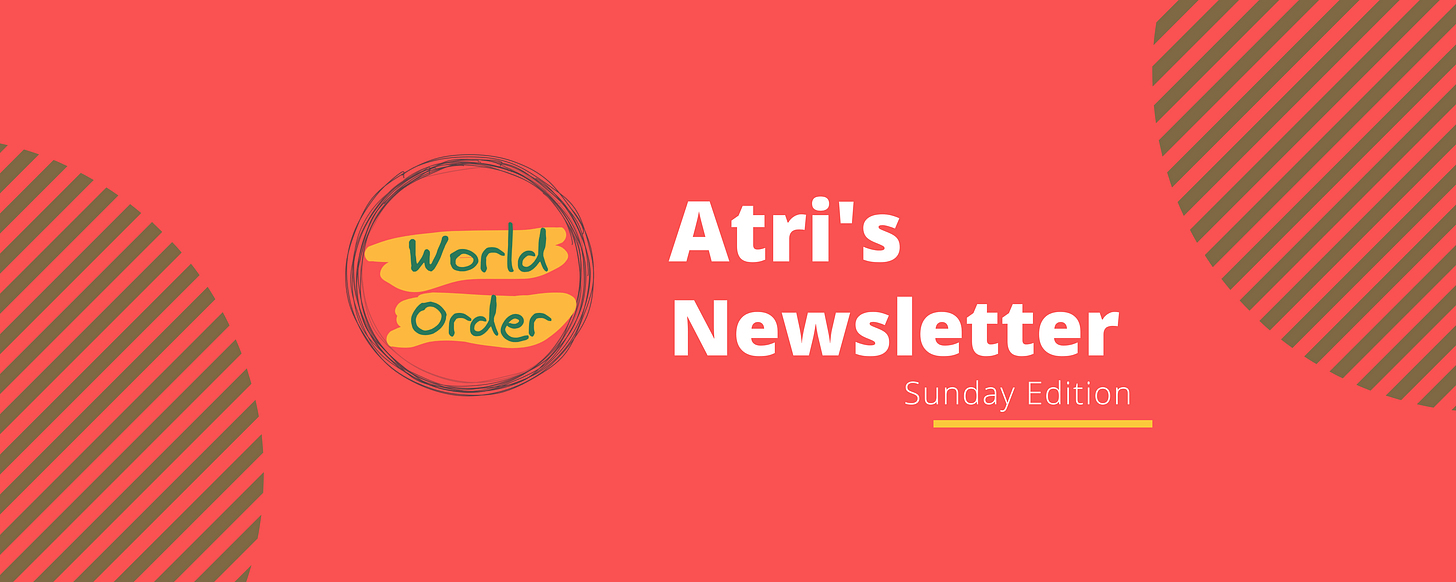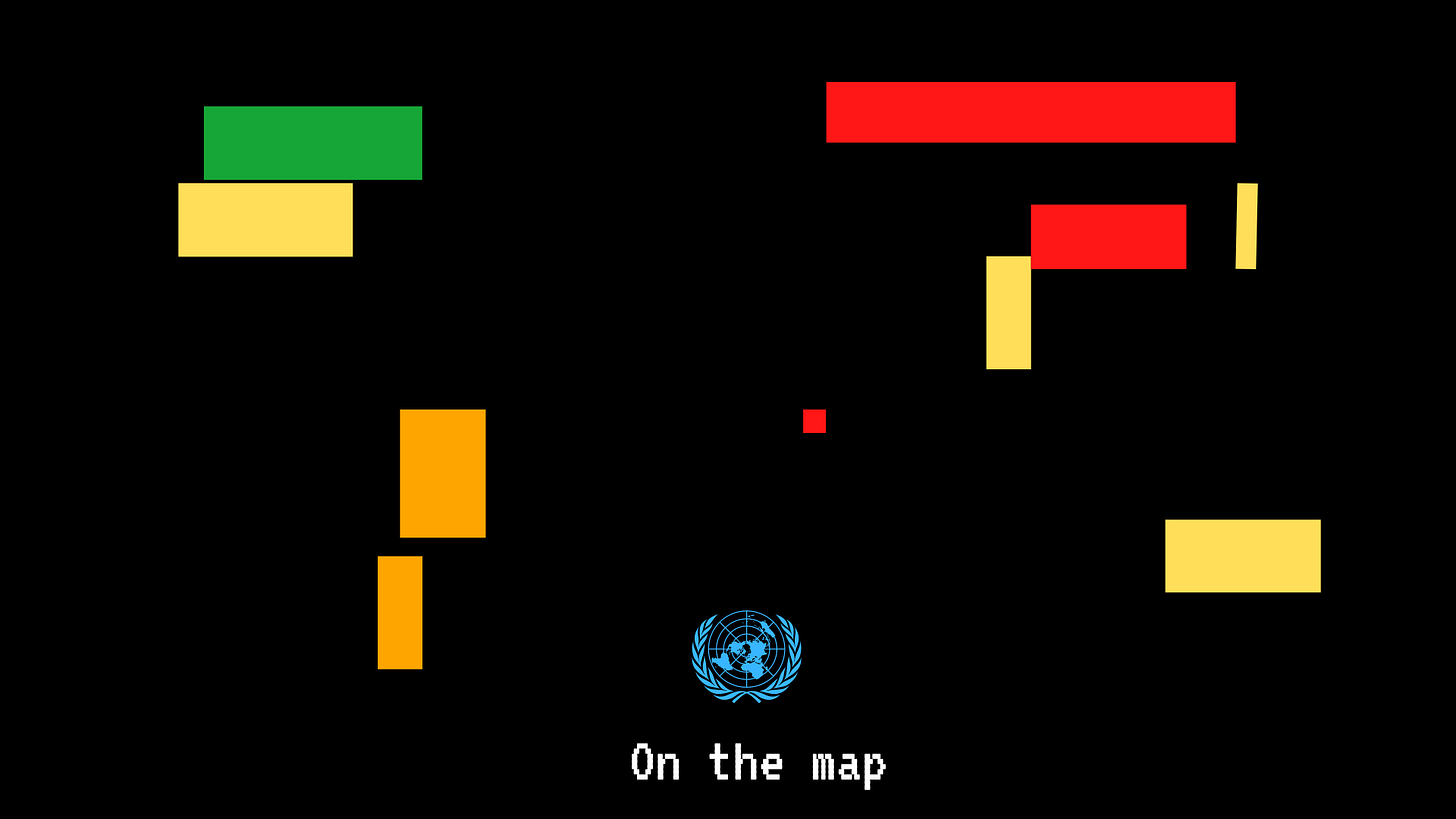Does the Quad have a core?
#15 Fifteenth Issue. From 19th to 25th September. On the developments at the UNGA, elections in Russia, China's Evergrande problem, and a review of the show Ted Lasso.
Hey everyone, welcome back! It’s been quite a busy week, with the UN and the QUAD summit dominating the news cycle. But the news that fascinated me the most was the story of Paul Rusesabagina (don’t worry I’ll also think twice before trying to pronounce his last name), the person on whom the film Hotel Rwanda was based, and also the person the Rwandan government decided to punish as a terrorist this week.
Mr. Rusesabgina was hailed as a hero by the western media for his attempts to protect the lives of his fellow commoners during the Rwandan genocide of 1994, but his criticism of Paul Kagame, the ruling president of Rwanda, made him a pariah in the eyes of his country’s media and judicial system. What strikes me is how rightly his story fits into narrative of “one man’s savior is another man’s terrorist.”
By the way, the Canadian Prime Minister, and legit Instagram influencer, Justin Trudeau won an election with his political party. But it was not a major news as it was just a repetition of a past trend. Now that being out of the way, we should move to the main stories:
The core of quad
Joe Biden, Yoshihide Suga, Narendra Modi, Scott Morrision, four leaders of the Asia-Pacific, or should I say the Indo-pacific, which is the reigning buzz word now, got together in Washington to mark the first in-person meeting of the leaders of the new regional alliance QUAD.
Why gather? Though it’s the democratic values of the four countries that they say is pulling them together, it’s clearly an aggresive China, which surprisingly wasn’t mentioned a single time in the official joint statement, that brings these four regional powers together:
India, fueled by the border dispute with China in the north, joined the group abandoning its reluctancy of getting closer to superpowers.
Similarly, Japan and Australia, which are major economic partners with China and share some maritime and trade disputes with the rising power, were happy to join hands with the US to reshape the balance of power in the Indo-pacific.
And the US, moving away from the forever wars of the Middle-East, is interested in Indo-pacific as it sees in the region potential for security cooperation and economic partnership.
Future plan: India, being a regional power itself, knows that it shouldn’t put all its eggs in one basket. Hence to preserve the multi-polar Asian order, without any singular dominant superpower, which is probably what China desires, India now actively participates in multiple coalitions, including the ASEAN. Speaking of coalitions, experts have argued that India has nothing to loose from the other recent partnership, AUKUS, as having European powers in the Indo-pacific, the UK in this case, is always in the interest of India.
Though multiple issues—such as climate change, supply chain resilience, critical technologies, infrastructure financing—occupy the minds of the leaders of QUAD, the lack of a singular focus is not necessarily a bad thing, as it provides flexibilty for each member and offer opportunities for wider cooperation.
Putin always wins
In an election to the lower house of the parliament, president Vladimir Putin’s political party United Russia secured majority, winning two-thirds of the 450 seats. But the election was anything but free and fair, plagued with allegations of voter fraud and electoral manipulation.
The drama: During the election, Alexei Navalny, the popular Russian opposition leader, was in jail serving a sentence for a 2014 conviction. His political group, the Anti-Corruption Foundation, banned as an “extremist” organization, was prevented from operating on the internet their campaign of smart voting—a strategy of encouraging voting for opposition candidates from other parties—with their websites being taken down and Google and Apple being forced to remove their apps from their app stores.
Other than that, before the elections the authorities censored critical media coverage of the President and his party, with allegations of manipulation of the vote counting process following the victory. But in spite of all this effort, the United Russia party saw its total share of votes fall from that of 54% in 2016 to only 49% this year, which is indicative of the declining popularity of the authoritarian regime and the growing influence of the opposition parties like the Communist Party.
China’s Evergrande moment
China’s second largest property developer, the Evergrande group, faces a debt and interest payment of 300bn dollars, which it is quite unlikely to be able to pay, the consequences of which will not only affect the common people who paid it money but also the real estate sector which constitutes 29% of China’s GDP and the regional economies which face the risk of a financial crisis crossing their borders.
Why you ask? Some Chinese investors perceive the real estate sector as a safe place for their investments, with expectations of good returns. But Xi Jinping, and the Communist Party, have tried in recent years to regulate the exploding home prices and discourage speculation in the real estate market, partly to appease the lower and middle class home-buyers on whom the Party depends for regime stability.
Rules launched last year, the three red lines, effectively imposed a limit on how much debt property companies like Evergrande were allowed to bear, forcing these companies to reconsider their heavy dependence on borrowed money, which also increases the risk in the financial system.
Now what? If Evergrande fails to repay its debt, the Chinese government, reluctant to offer a wholesale bailout to the company, has asked local governments to limit the damages caused by the collapse, by protecting the people who stand to loose their jobs and the people who booked a property through the company or lent it money. Whatever might be the case, the Party has signaled again that if it ever comes to choosing between the people and the capitalist, it will choose the people.
I have a speech too!
At the ongoing 76th session of the United Nations General Assembly, world leaders found a stage to preach their agendas and provoke their enemies.
Starting with Joe Biden, who now claims the leadership of the free world, presented quite an ambitious wish list: “ending this pandemic; addressing the climate crisis; managing the shifts in global power dynamics; shaping the rules of the world on vital issues like trade, cyber, and emerging technologies; and facing the threat of terrorism as it stands today.”
Then the Chinese president announced in his speech that he appreciates the global united effort against COVID and his country won’t finance any new coal power plants through the various development projects it undertakes.
While the Indian Prime Minister emphasized the need to “protect oceans from race for expansion and exclusion,” (South China Sea, Indian ocean!!) the Pakistani Prime Minister tried to bring attention to global Islamophobia by calling out the Indian government and labeling it fascist, for which he was trolled by a young Indian diplomat who instantly became a twitter celebrity.
To sum it up, climate change, covid-19, and vaccine inequality dominated the discussions at the UNGA. And speaking of vaccine inequality, the Pan American Health Organization (PAHO), a multilateral organization has selected two centers in Argentina and Brazil for development and production of mRNA-based vaccines, not only for COVID-19 but also for other future infectious diseases.
Know your map:
The Brilliance of Ted Lasso:
When Tim Cook started his presentations at the 14th September Apple event, he kicked it off with scenes from Ted Lasso. A week later, at the Emmy awards, it was again Ted Lasso: outstanding comedy series, lead actor in a comedy series, supporting actor in a comedy series, and supporting actress in the comedy series. It came. It saw. It won.
I watched the first season of the show in late July. And I’m currently watching the second season (ten episodes so far). To be honest with you, I don’t really get 40% of Ted’s jokes, mainly the ones with references to 80s or 90s pop culture, but also the ones specific to Kansas or the other experiences specific to Jason Sudeikis. But the show, as Coach Beard recently mentioned in an interview with Jimmy Kimmel, is very dense, packed with jokes, a dozen a scene, a couple a frame. So even if you don’t understand 40% of them, the other 60% will have you rolling on your stomach.
But the jokes aren’t the only reason people watch Ted Lasso. Yes, we love the jokes, but more than the jokes, we are there for the characters, being affected by them as they find and manage their flaws. Every character has a flaw, be it a footballer in the team or the main characters themselves, who given the demand for recurring appearance are often endowed with multiple flaws. And over the course of one episode, or a season, because of the genius ways the writers plot the show, all the characters become aware of their flaws and gradually work towards, or are forced to work towards, eliminating them.
And the often wise, beautifully articulated synthesis that comes at the end of every character’s arc is the stuff that keeps us all glued to our screens. (Season two of Ted Lasso streams on Apple Tv+)
I learned; I was inspired:
The colored text holds the links to the articles, book excerpts, interviews etc. You can suggest me books, articles, and interviews either by commenting below or by connecting with me on social media.
An essay from Amitav Ghosh
Amitav Ghosh has been writing about climate change for the last few years. This essay, published in the Orion magazine, is a meditation on the concept of brutes. He writes, “the questions of who is a brute and who is fully human, who makes meaning and who does not, lie at the core of the planetary crisis.”
The other side of Peter Thiel
Some of you might know Mr. Thiel from his book on entrepreneurship, Zero to One, others might know him as the backer of Palantir, the controversial start-up that specializes in mass surveillance. Thiel, though not the most successful investor in Silicon Valley, is certainly someone who enjoys a great degree of influence and power inside and outside of the valley. That influence and power is the subject of a new book, The Contrarian, from which Bloomberg has published this thrilling excerpt.
An assassination in the age of AI
“Convinced that Mr. Fakhrizadeh was leading Iran’s efforts to build a nuclear bomb, Israel had wanted to kill him for at least 14 years. But there had been so many threats and plots that he no longer paid them much attention,” but little did Mr. Fakhrizadeh know that it’s not through humans but his death would come through the barrel of an AI-enhanced machine gun, positioned strategically, and controlled remotely.
A memoir from today’s China
“Despite their flaws, mistakes and crimes, China’s business types have played an important role in lifting the country out of poverty and building it into the world’s second-largest economy — something the Communist Party is reluctant to admit,” writes Li Yuan in this review of a tell-all memoir by a former Chinese businessman.
Share the newsletter if you find it useful. You can always reach me by either replying to this email, from your inbox, or by commenting on the website. That’s it for this week. Thanks for reading. Good luck. See you next Sunday!



